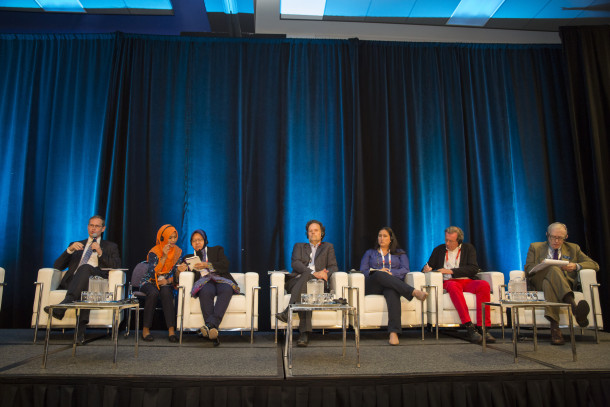 Louis-Charles Dumais
Louis-Charles Dumais
Urban Innovation for the local implementation of global agendas
On June 20 in Montréal, Guangzhou led the concurrent session “Cities in Action: Urban Innovation and the implementation of the global agendas” of the XII Metropolis World Congress. The session was comprised of two parts: a presentation of the Guangzhou International Award for Urban Innovation, and a panel discussion focusing on initiatives undertaken in different regions of the world in the realm of urban innovation, including living case studies from Berlin, Brussels, Medellin and Surabaya.
The session counted on presentations by:
- Michael Müller, Mayor of Berlin, who presented his city’s innovative strategies for absorbing and integrating a massive influx of refugees in his already rapidly growing city;
- Tri Rismaharini, Mayor of Surabaya, who showed innovative and participatory approaches used to improve quality of life and enhance local economic development in the kampungs of her metropolis;
- Benoît Perrilleux, Director of Planning of the Brussels Capital Region, who presented the integrated action plan and partnership arrangements for the rehabilitation and revival of the Brussels canal area;
- María Luisa Zapata Trujillo, Deputy Director for Knowledge Management at ACI Medellin, who highlighted the contributing factors to policy continuity over a period of more than two decades in the City of Medellin;
- Georges Ferguson, first elected mayor of Bristol (2012-2016), who told the lessons learned from engaging people and communities in implementing Bristol’s smart city approach;
Despite the different contexts, challenges and approaches that were adopted by different cities, the five case studies provided ample evidence of how cities are already meeting some of the targets and commitments of the global agendas. They are doing so by:
- Providing basic services for all citizens by putting people first and leaving no one behind: this was most notably the case for Surabaya and Medellin;
- Making our cities cleaner, greener, more resilient and liveable: this was most notably the case with Brussels and Bristol;
- Fully support the rights of refuges, immigrants and internally displaced people amply illustrated by the case of Berlin
- Provide safe, accessible and green public spaces also amply illustrated by Brussels, Medellin and Surabaya.
The session also counted on a speech by Neal Peirce, founder and Editor-in-chief of Citiscope, who underlined the relevance of the Guangzhou Award process and its unique knowledge base on urban innovation to the local implementation of the SDGs and the New Urban Agenda, from the perspective of the media.
The Guangzhou International Award for Urban Innovation honors initiatives that respond to the challenges of social, environmental and governance issues faced by cities around the world, with the aim of improving the quality of life of their citizens. The award is bestowed every two years, and since its first edition, in 2012, has counted on the institutional support of Metropolis and UCLG. After each edition, we have been increasing international exchanges and cooperation on urban innovation, encouraging the development of research on the subject, and guiding decisions on public policies.

